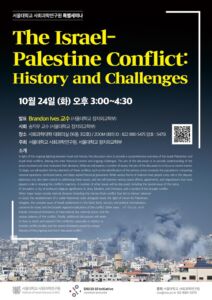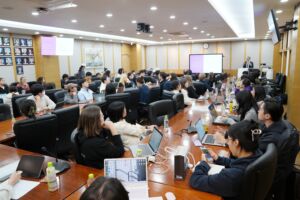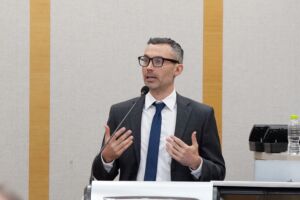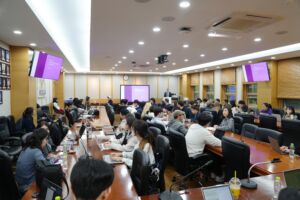“The Israel-Palestine Conflict: History and Challenges”를 주제로 서울대학교 사회과학연구원,
정치외교학부 10-10 사업단이 특별세미나를 개최하였습니다.
– 날짜 : 10월 24일(화) 오후 3:00 – 4:30
– 장소 : 사회과학대학 대회의실 (16동 312호)
/ ZOOM 접속 : 822 880 5475 (암호 : 5475)
* 유튜브로 동시 중계
– 발표 : Brandon Ives 교수 (서울대학교 정치외교학부)
– 사회 : 송지우 교수 (서울대학교 정치외교학부)
– 주최 : 서울대학교 사회과학연구원,
서울대학교 정치외교학부 10-10사업단
Abstract
In light of the ongoing fighting between Israel and Hamas, this discussion aims to provide a comprehensive overview of the Israeli-Palestinian and
Israeli-Arab conflicts, delving into their historical context and ongoing challenges. The aim of the discussion is to provide understanding of the actors involved and
what motivates their decisions. While we will explore a number of issues, the aim of the discussion is to focus on recent events. To begin, we will explore
the key elements of these conflicts, such as the identification of the primary actors involved, the populations’ competing national aspirations,
territorial claims, and deep-seated historical grievances. While various forms of violence have played a key role in the dispute, diplomacy has also been
central to addressing these issues, and we will examine various peace efforts, agreements, and negotiations that have played a role in shaping
the conflict’s trajectory. A number of other issues will be discussed, including the pivotal issue of the status of Jerusalem, a city of profound
religious significance to Jews, Muslims, and Christians, and a symbol of the broader conflict. Other major issues include internal divisions (including
the Hamas-Fatah conflict that led to Hamas’ takeover in Gaza), the establishment of a viable Palestinian state alongside Israel, the right of return for
Palestinian refugees, the complex issue of Israeli settlements in the West Bank, security and political normalization concerns for Israel, and the broader
regional implications of the conflict. Other areas of focus will include conceptual limitations of international law, external actors and the unique salience of the conflict.
Finally, additional discussions will relate to how to teach and research this conflict(s), especially in relation to broader
conflict studies and the severe limitations posed by unique features of this ongoing and much-discussed conflict.




